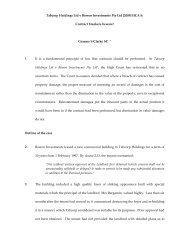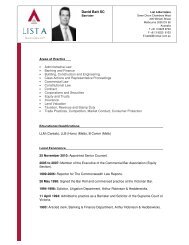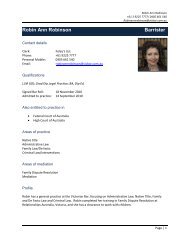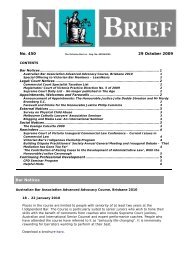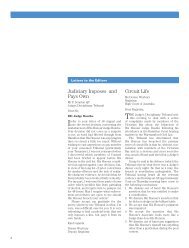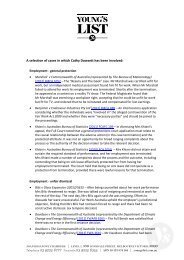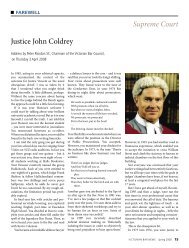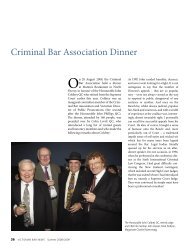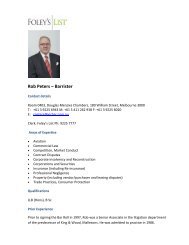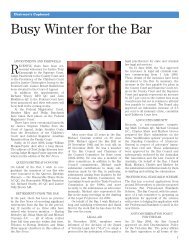to provide answers to the problems thatyoung women are likely to confront in thefuture. We now need to think about themore subtle strategies which may help tochange the hearts and minds of both menand women in the area of gender. Hencethe title of this talk.How do we consolidate past successesand make further improvements?Although there are no simple answers tothis question, I want to talk about fourinter-related strategies which may beuseful to women in general and to womenbarristers in particular. These are:• focusing on cultural and institutionalchange;• cultivating allies;• the importance of leadership; and• the importance of women supportingwomen.66FOCUSING ON CULTURAL ANDINSTITUTIONAL CHANGEThe first strategy requires us to identifyinstitutions and practices in the legal professionand at the <strong>Bar</strong> which reinforce thestructures of gender and to think abouthow they can be changed. I recently rereadLord Woolf’s report on civil procedurereforms which emphasises the needto win the hearts and minds of practitionersif the huge machine of the civil justicesystem was to be re-calibrated. Gender isa much more entrenched institution thanthe civil justice system and it will take acorrespondingly greater effort to disturbthe pre-conceptions that exist about theappropriate roles of men and women.To deal with issues of culture I thinkit is important to look at both the cultureof masculinity and the culture ofthe legal profession. There is now a largeand fascinating research literature on thetopic of the culture of masculinity, whichmy associate and I have had great funreading. Unfortunately I could not quitedecide how to work in quotes from an articlecalled “Why Marcia, You’ve Changed!Male Clerical Temporary WorkersDoing Masculinity in a FeminisedOccupation.” 14Research on masculinity and workshows that when women begin to enteran area of work in significant numbers,what is seen as men’s and women’s work isredefined. Throughout history men havetended to vacate a field of work whenlarger numbers of women begin to enterit and to find new areas which they candefine as their own. As a result womentend to be segregated into the less prestigiousand well paid areas of the particularprofession or occupation. This pattern isRuth Hamnett, Fiona Ryan and FionaForsythe.already apparent in Law Schools, where Ipredict that the majority of legal academicswill eventually be women.An entertaining example of this phenomenonis described in Joan Eveline’swork on the changes which occurred inthe Western Australian mining industry.When women started to get jobs drivingheavy machinery, which was previouslyseen as “a man’s job” men began to takeon heavier and dirtier tasks, and drivingbig machines came to be seen as a task forwomen. 15It may be worth thinking aboutwhether a similar pattern exists in thelegal profession and at the <strong>Bar</strong>. In lawfirms my impression is that some youngmale lawyers now see working very longhours as a mark of masculinity, in thesame way that doing dirty work become adefining feature of masculinity in the miningindustry. Young women lawyers oftenadopt these patterns for a time, but I havethe impression from a group of women Ihave recently mentored that, in the longterm, this may well drive them out of privatepractice.The literature I have referred to abovesuggests that women barristers needto think about whether their increasingnumbers have led to the re-emergenceof patterns of gender differentiation. Forexample, are women seen as more suitedto opinion work or to the less lucrativeareas of practice? Do they tend to getbriefed in particular areas such as propertylaw or family law? What is it aboutthe culture of the <strong>Bar</strong> which results inyoung male barristers having more accessto speaking roles in court than youngwomen? If so how can these patterns ofgender differentiation be changed.CULTIVATING ALLIESIn order to create cultural change it isessential for men and women to worktogether.Many successful women speak of thehelp and support they were given byAnne Sheehan and Caroline Kirton.peers at early stages of their career. In mycase it was at Ron Sackville, now <strong>Justice</strong>Sackville’s suggestion, that we wrote aproperty law text together. Although hewas only a little more senior than I was,his support gave me the confidence to putmy foot on the first step of the academicladder.Sadly some men in the communitysee themselves as being harmed by theimproved status of women. Discussionof the difficulties which face womenbarristers and women in the workforcesometimes produces hostile or scepticalresponses from men. I was struck by arecent example. In my recent speech atthe <strong>Bar</strong> Readers’ Dinner, which did notdeal with gender issues at all, I made theoff-the-cuff remark that it was probablystill harder for women barristers than formen to balance work and family responsibilities.A man at the next table muttered,(not particularly sotto voce) “rubbish”. Ifthat response is representative of viewsheld by some men at the <strong>Bar</strong>, women stillhave a long way to go.When I spoke to women barristers in2001, I referred to Deborah Rhode’s workin the United States, which argued thatthe first step towards gender equality isto convince those in power that thereis actually a problem. Many barristersacknowledge the practical and structuraldifficulties faced by women at the <strong>Bar</strong>.I think it would be a useful strategy toconvince them to articulate their supportand contribute their advocacy to women’scauses.There are other small ways in whichmale barristers can support women.Most of us have been in situations wherea member of a group makes a racist,homophobic or anti-Semitic comment.I think that many of us are prepared tosay that we object to such comments. Itseems to me to be less common for men toreact adversely to misogynous remarks orcomments which denigrate the achievementsof women barristers. I don’t recall
any American men speaking up whenArnold Schwarzenegger chided his politicalenemies by calling them “economicgirlie-men”. 16 We need to persuade thosewho are sympathetic to women’s causes tospeak up when necessary.On a more serious note, this is alreadyhappening in the world outside the law,where attempts are being made to enlistmen who abhor violence in the causeof reducing violence against women.Saturday is Stop Violence against WomenDay. Its great to see more men this yearwearing white ribbons.If we are making alliances with men itmay also be useful to draw attention tothe areas in which men have benefitedbecause women have placed issues on theagenda. Men are likely to benefit if thereis greater flexibility in working hours; menmay also benefit from a culture whichencourages them to balance the joys ofwork with the joys of family life.Women should be reminding men thatwe are not seeking to pole vault over thembut to create an environment of equality,which benefits us all.ENCOURAGING LEADERSHIP.My third strategy focuses on the importanceof leadership in working towardsgender equality at the <strong>Bar</strong> and in thebroader community.Research done in the 1980s by ProfessorFay Gale shows that women are morelikely to succeed in universities in whichVice-Chancellor and senior Professors arecommitted to gender equality. 17 Similarfindings have been made in the corporateworld, where the support provided bysenior managers can change workplacedynamics and ensure that women’s talentsare recognised and developed. As a younglegal academic I was very grateful for thementoring and support provided to me bysome senior legal academics. Initially all ofthem were men, but as more women wereappointed to Chairs I also received somesupport from women.The <strong>Bar</strong>, of course, does not work likea university or a commercial entity. Itsstructures are more diffuse and individualised.Nevertheless there are both maleand female leaders at the <strong>Bar</strong> who arewidely respected and who have the capacityto provide leadership on gender issues.The <strong>Bar</strong> Council made an excellent startby commissioning its 1998 “Report onEquality of Opportunity For Women” atthe <strong>Bar</strong>. It needs to keep up that momentum.I note the presence here of both menand women who have given importantleadership in the area of gender equality.THE IMPORTANCE OF WOMENSUPPORTING WOMENI have already spoken of the important rolethat allies and peers can play in breakingdown gender stereotypes and encouragingindividuals to make the best of theirtalents. When women first moved intoareas which were previously monopolisedby men it was common for them to takeon masculine colouration. Unfortunatelythis sometimes made it difficult forthem to support their female colleagues,for fear of being seen as different or incapable.While this attitude was understandable,I hope it no longer exists. One ofthe purposes of the Women <strong>Bar</strong>risters’Association is to provide that support. Itis interesting, therefore, that I have heardsome women lawyers question the needfor a distinct organisation for women.In their view, we have now reached theposition where we can afford to be genderblind. I do not agree with that view. I congratulateand support the work done bythe Women <strong>Bar</strong>risters’ Association providingsupport for its members.In 1998 Neil Young (as he was then)Chairman of the <strong>Bar</strong> Council wrote tothe Steering Committee of the Projecton Equality of Opportunity for Women atthe <strong>Victorian</strong> <strong>Bar</strong>, to <strong>Justice</strong> <strong>Charles</strong>, whochaired that Committee, to thank us forour work. In the letter he said that:the research findings indicate that womengenerally find it more difficult to gain entryto, and support from, the mainstream ofthe <strong>Bar</strong>. This difficulty may have significanteffects for individuals in terms of recognition,work satisfaction and success.This was written by the then Chairmanof the <strong>Bar</strong> Council just over seven yearsago. Though things have improved forwomen barristers, there is still room forchange.I cannot conclude this speech withoutsaying a few words about the HonourableRosemary Balmford. Another speakerwill be talking about her career at somelength, but I would like to briefly paytribute to her achievements (I hope shedoes not mind me referring to her asRosemary). When I was at Melbourne LawSchool Rosemary had a reputation as anexcellent teacher.American research shows that womenjudicial officers often have differentcareer paths from male judges. Rosemarypractised as a solicitor and was a seniormember of the federal AAT, before shewas appointed to the Supreme Court.Her success helped to demonstrate thatpractice as a barrister is not an essentialrequirement for judicial appointment.It blazed a trail for many other womenwho have now become judicial officers.We should all be grateful for Rosemary’soutstanding example.Notes1. According to figures available on the <strong>Victorian</strong>Supreme Court website.2. According to figures available on theCounty Court website3. According to figures provided by the Magistrates’Court.4. According to figures available on the FederalMagistrates’ court website.5. According to the <strong>Victorian</strong> <strong>Bar</strong> website.6. According to the <strong>Victorian</strong> <strong>Bar</strong> website.7. This survey did not cover Victoria.8. Bendable or Expendable? Practices andattitudes towards work flexibility inVictoria’s biggest legal employers. LawInstitute of Victoria, 2006.9. Forty-five percent of in-house lawyerswere women, as opposed to 52 per cent ofprivate practice lawyers.10. Harpley, K, “Women in House”, LawyersWeekly 2006.11. Sexual Offences: Final Report, <strong>Victorian</strong>Law Reform Commission, August 2004, theimplementation of which led to a series ofreforms, including the amendments in theCrimes (Sexual Offences) Act 2006.12. Defences to Homicide: Final Report, <strong>Victorian</strong>Law Reform Commission, November2004, resulting in a number of legislativeamendments in the Crimes (Homicide)Act 2005.13. The Australian authority is R v L (1991)103 ALR 577. In England the rule was abolishedby R v R [1991] 2 WLR 1065.14. Henderson, K.D., Rogers, J.K. Genderand Society Vol 15, No 2 (April 2001) pp.218–238.15. “Gender and Sexuality in Discourses ofManagerial Control: The Case of WomenMiners” in Gender, Work and OrganizationVol 9, No 5, November 2002.16. Speech by California Gov. ArnoldSchwarzenegger Tuesday, August 31,2004, cited http://www.cnn.com/2004/ALLPOLITICS/08/31/gop.schwarzenegger.transcript/.17. This work was expanded upon at theUniversity of Western Australia. See forexample “Creating Opportunities: AnEvaluation Of The Leadership DevelopmentFor Women Programme 1994–1997”University of Western Australia, cited http://www.osds.uwa.edu.au/about/activities/ldw/successes/evaluation/opportunities/.67




